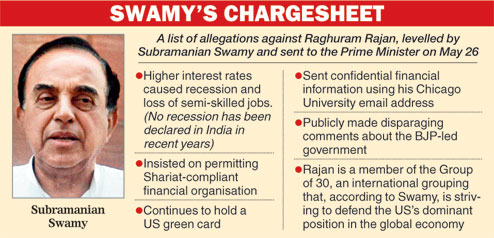
New Delhi, June 18: Deed done, the Modi government is scurrying for explanations.
The government's biggest fear is Dalal Street would open in the red on Monday, speculation on FII pullout would revive seriously and India's global TRPs would be impacted by prospective adverse notices in the pink papers.
Raghuram Rajan's imminent departure as the RBI governor has left Narendra Modi and finance minister Arun Jaitley "discomfited", although the Prime Minister did nothing to contain Subramanian Swamy's campaign of calumny against Rajan. Jaitley had disapproved the Rajya Sabha MP's attacks.
Today, he said the government "respects his (Rajan's) decision" and would announce a successor shortly. But questions lingered.
A pat explanation coming from government sources was that Rajan's was an "autonomous" decision in which the Centre had "no role". Rajan has made it clear he had been open to continuing in office and that he had taken the decision to return to academics after consultation with the government.
"Why should the government be held responsible for a decision that was wholly and solely his own?" asked a source privy to the developments that culminated in Rajan's announcement today.

But Swamy, who continued his tirade against Rajan on Twitter today, said the RBI chief had taken the decision because "he has realised he would not get a second term".
Swamy's campaign of calumny and disinformation against Rajan was dismissed by sources as his "private views" that, they claimed, had started before his Rajya Sabha nomination. However, nobody could explain why Swamy, an RSS favourite, had consciously stepped up his attacks on Rajan after getting his berth with letters to Modi.
Last week, when a BJP leader was asked to respond to Swamy's fulminations during an informal media interaction, he had said: "Those are his private views." Quizzed on whether the party sanctioned such views, there was silence.
The fact underlying the troubled Rajan-Modi regime equation is that from the time the UPA appointed him, the BJP has had its knives out for him. Shortly after he was installed in the RBI, a veteran BJP MP, now sidelined, questioned Rajan's citizenship, asking if had forsaken his Indian passport to live in the US.
The MP was prevailed upon by senior colleagues to pull his punches. But Rajan was an eyesore for the Sangh parivar. Indeed, the BJP sometimes wondered if his tenure could be truncated before September 2016.
Like the Congress and the Left, the RSS and the BJP are also obsessive about leveraging key statutory appointments both as a means of patronage and leaving an ideological imprint on the polity.
Recall the parivar's deep-rooted resentment when Atal Bihari Vajpayee appointed Brajesh Mishra as his national security adviser and principal secretary. Mishra was not a lateral entrant, having served as the convener of the BJP's foreign cell and a member of the national executive.
Yet, the RSS never forgot that he was the son of Congressman Dwarka Prasad Mishra who, as a minister of the Central Provinces, had RSS leader M.J.S. Golwalkar arrested after Mahatma Gandhi's assassination.
When Vajpayee appointed the "secular and liberal" Vibha Parthasarathy, the daughter-in-law of former diplomat G. Parthasarathy, as the chairperson of the National Commission for Women in 1999, he was criticised by the BJP for "overlooking" the claims of a former party MP, Jayawantiben Mehta.
RSS sources asserted Swamy's views on Rajan, accused by him of being "anti-national" and "shielding" certain "corrupt" persons in the UPA dispensation, were fully sanctioned by their seniors. "Swamyji is a true Indian, he has the country's interests at heart," said a Sangh official.
But the BJP, aware of the respect Rajan commanded in academia and the global corporate sector, was forced to measure its words publicly.
Therefore, Jaitley commended him from time to time and Modi called him a "great teacher" who was "perfect in explaining complex economic issues" at the RBI's 80th anniversary celebrations in April 2015. When it came to the question of giving Rajan a second term, the government's top echelons smiled it away.
In a tussle in which the RSS and the BJP's anti-Rajan lobby were arrayed against those conscious of the big economic picture and Rajan's ability to stay the course when required, there was still doubt who would win.
The first sign of things being amiss was visible when the commerce and industries minister, Nirmala Sitharaman, denounced Rajan likening the Indian economy to a "one-eyed king in the land of the blind". Asked to react in a media conference, Nirmala was quoted as saying: "I may not be happy with his choice of words. I think whatever action is being taken by this government is showing results."
Even Jaitley sounded a tad miffed with Rajan's comments and waxed elaborately on a purported economic turnaround.
However, at the nub of the relationship was Rajan's refusal to scale down the interest rates that the government and the BJP believed was stalling growth.
Shaurya Doval, a director of the RSS-aligned think tank, India Foundation, and the head honcho of an investment firm, Zeus Caps, said: "There were two ends to the Rajan spectrum. One extreme celebrated his good looks and rockstar following, the other was branding him as a CIA agent."
He claimed that "the truth is without lowering interest rates, there is no growth and without growth, there are no jobs, no Make in India."
Doval feels Rajan's departure is not about to bring the ceiling down. "Rajan's departure may have an impact for a week because the Indian economy rests on the back of institutions of which Rajan was an important part in a relay race. His predecessors have meandered the economy through crises. When we place undue reliance on individuals, we weaken institutions, which, in the long run, is not in national interest."











